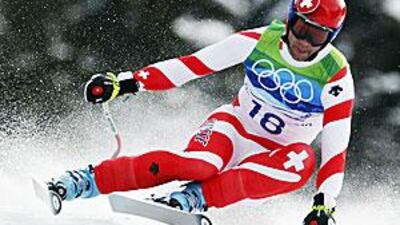VANCOUVER // Didier Defago became the oldest man to win the men's downhill at the Winter Olympics on Monday while China broke Russia's astonishing 46-year grip on pairs skating gold. Elsewhere, Canada failed to build any momentum from Sunday's first gold on home soil and two US ice hockey netminders were told the slogans on their helmets must be removed.
Defago, a 32-year-old veteran of the World Cup ski scene who had never come close to the Olympic podium before, scorched down the Dave Murray course in Whistler to become the first Swiss to win the men's blue riband event since Pirmin Zurbriggen in 1988. "I knew that the course would suit me well," said Defago, who eclipsed his favoured teammates Didier Cuche and Carlo Janka. "I have been looking for a podium for a long time."
The event, for many the showcase of the Winter Olympics, was also a tale of redemption for a more famous 32-year-old racer, Bode Miller. Miller, the wild child of American skiing, as well known for his partying as his two World Cup championships, took the bronze medal, finishing close behind Aksel Lund Svindal of Norway. China broke Russia's remarkable domination of pairs figure skating dating back to the 1964 Games in Innsbruck.
The husband-and-wife duo of Shen Xue and Zhao Hongbo came out of retirement to lead a Chinese one-two. "Today's medal is a completion of a dream after so many years," said Shen, who had kissed the medal in unison with her husband while on the podium. A grinning Shen then immediately set her sights on their next goal: "It's hard to continue skating, maybe it's time to have a baby." No sooner had the flotilla of NHL players arrived in Vancouver for the hotly-anticipated ice hockey competition than the US team found themselves in hot water.
Jonathan Quick, their netminder, has been ordered by the International Ice Hockey Federation (IIHF) to remove a "Support Our Troops" slogan seen on his helmet at training on Monday, a logo that contravenes International Olympic Committee (IOC) rules on political propaganda. His fellow goalie, Ryan Miller, was told to lose the "Miller Time" motif on his helmet although he was hoping "Matt Man", a tribute to a dead friend, would be allowed to stay.
"We will inform the American team and their equipment managers that this is a violation of IOC rules," said Szymon Szemberg, an IIHF spokesman. Monday's competitions, and the winners' smiling faces, were a welcome change from the dismal start to the Olympics, where organisers dedicated the opening ceremonies to Nodar Kumaritashvili, the Georgian killed in practice on a scarily fast luge track, and rain and fog forced postponements of weekend Alpine skiing events.
For the hosts, Canada, a poor showing in the downhill, a last-gasp loss to the Americans in snowboard cross, and an out-of-the medals performance from their speedskating hopeful Jeremy Wotherspoon brought the nation back to earth after their first home-turf Olympic gold on Sunday. Canada hosted Olympic Games in Montreal in 1976 and Calgary in 1988, but won no golds at either, so Alex Bilodeau's moguls victory on Sunday was especially sweet.
But things were back to normal on Monday. Manuel Osborne-Paradis, the Vancouver skier and a downhill favourite, lost precious ground on the lower part of the Whistler course and ended back in the pack. Hours later the American boarder Seth Wescott soared past Canada's Mike Robertson at the end of the hot-dog four-man race to take the gold. Coming up today is the women's downhill, where American hopes of victory are carried by Lindsey Vonn, a double world champion who has never won an Olympic medal. But Vonn dampened those hopes when, speaking after the racers' first full training run, she said she was shocked by the bumpy, jarring course, which might bode poorly for a shin injury she is recovering from.
* Reuters

